Tolling is beginning to look like a money grab
By Cam Gilmour
Portland Tribune Jan 16, 2024
On Dec. 14 and Jan. 6 the Oregon Legislature’s special committee on transportation planning held meetings in Wilsonville and Gladstone to hear from the public and local elected officials on tolling. What the committee heard from testimony is no one wants tolls.
Those testifying were well informed. Their testimony indicated tolling will cause financial hardships and harm the business environment of Clackamas County. Meanwhile, toll avoiders will use local roads, making these roads less safe.
ODOT originally proposed to reconstruct bridges and add two travel lanes between the Tualatin River Bridge and Abernethy Bridge, a distance of 7 miles. Other projects originally planned with tolls involved reconstruction of the I-5 Boone Bridge near Wilsonville, which is not funded, and the I-5 Interstate Bridge replacement, which is partially funded but many years away from the start of construction.
The I-205 Toll Project project was “paused” after an impact assessment on the project was released in February 2023. Rather than public opposition stopping the project, an updated project cost estimate doubling the original cost made the project financially infeasible. Gov. Tina Kotek ordered ODOT to pause the project until 2026, which has not stopped tolling on I-205.
ODOT now plans to place I-205 tolls at the Abernethy Bridge in Oregon City, but dropped plans to add new freeway lanes and reconstruct outdated bridges. The Abernethy Bridge is being reconstructed as a separate project, now underway, and nearing completion.
Abernethy tolls could begin in 2026, and ODOT continues to spend millions of dollars on tolling infrastructure work needed to make this happen. This work will also support having tolls elsewhere such a the I-5 Interstate Bridge, whose replacement is under development and includes tolling as a funding source.
Legislation in 2017 mandated ODOT to pursue tolling freeways to supplement ODOT’s revenue and reduce traffic congestion. Most people in the Portland metropolitan area would welcome relief from traffic snarls, but not by discouraging freeway trips through tolls. Regular users of Portland-area freeways are experts on the non-freeway routes to take when freeways slow to a crawl, a daily occurrence. Tolling will only make this traffic diversion worse, further harming the livability of the neighborhoods, safety in school zones and viability of business areas that receive this unwanted traffic.
How many people know about ODOT’s tolling plans? How many people know that tolling in the absence of adding freeway lanes will not reduce congestion to any meaningful degree? How many people know that toll revenue is expensive to collect — reducing the net revenue collected — and will not be shared with cities and counties, as the gas tax is?
It is unlikely TriMet will receive a meaningful number of new riders because of tolls. Buses get stuck in traffic too, and have unrealistic time constraints most people cannot accommodate.
ODOT plans to toll all existing freeway lanes without offering relief from stop-and-go traffic. Tolling, to be effective, has to be combined with significant increases in traffic capacity (new lanes, auxiliary lanes) and pricing (tolls) on the new lanes only — called express toll lanes — as is done in other states around the country. If you can’t afford the toll, you still have the non-tolled freeway lanes to use. This is not being planned for Portland-area freeways.
Again, ODOT is barreling ahead with tolls under the guise of congestion reduction as they promoted in the “original” I-205 Toll Project. That project added two lanes to the freeway, a 50% increase in traffic capacity. It was freeway capacity, not tolls, that accounted for the travel time reductions touted for that project, now sidelined. Tolling is beginning to look like a money grab. And, you will still be stuck in traffic paying tolls.
The legislature should act now to correct the policy direction it gave ODOT in 2017. The special legislative committee on transportation planning should shift its attention to how to pay for long overdue improvements to the Portland freeway system. More planning isn’t needed. Action by your elected representatives is needed. Tolling as planned is not the answer.
Cam Gilmour is retired from serving as ODOT’s deputy director of finance and administration, Clackamas County’s director of transportation and development and the state of Washington’s transportation department’s chief operating officer.


